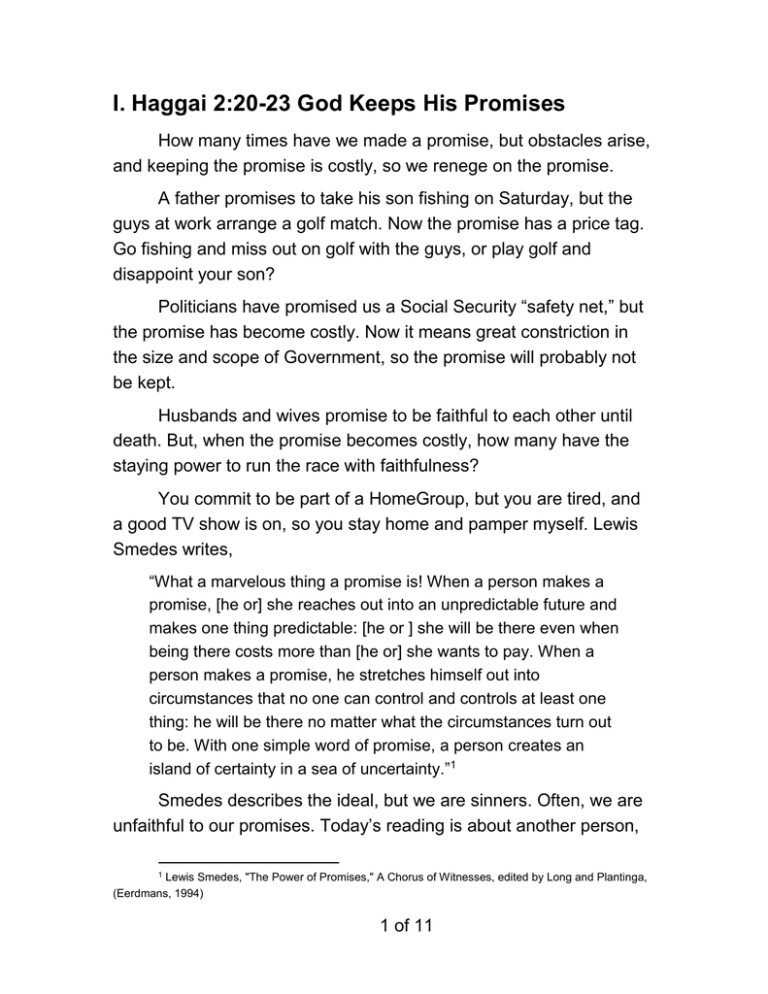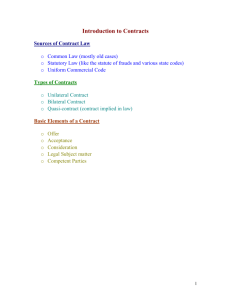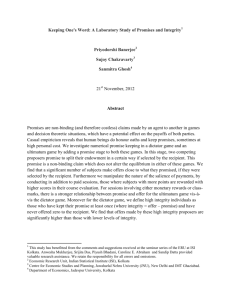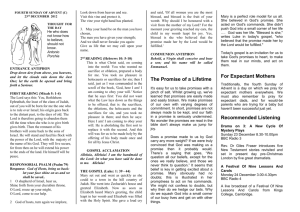Haggai 2:20-23 God Keeps His Promises
advertisement

I. Haggai 2:20-23 God Keeps His Promises How many times have we made a promise, but obstacles arise, and keeping the promise is costly, so we renege on the promise. A father promises to take his son fishing on Saturday, but the guys at work arrange a golf match. Now the promise has a price tag. Go fishing and miss out on golf with the guys, or play golf and disappoint your son? Politicians have promised us a Social Security “safety net,” but the promise has become costly. Now it means great constriction in the size and scope of Government, so the promise will probably not be kept. Husbands and wives promise to be faithful to each other until death. But, when the promise becomes costly, how many have the staying power to run the race with faithfulness? You commit to be part of a HomeGroup, but you are tired, and a good TV show is on, so you stay home and pamper myself. Lewis Smedes writes, “What a marvelous thing a promise is! When a person makes a promise, [he or] she reaches out into an unpredictable future and makes one thing predictable: [he or ] she will be there even when being there costs more than [he or] she wants to pay. When a person makes a promise, he stretches himself out into circumstances that no one can control and controls at least one thing: he will be there no matter what the circumstances turn out to be. With one simple word of promise, a person creates an island of certainty in a sea of uncertainty.”1 Smedes describes the ideal, but we are sinners. Often, we are unfaithful to our promises. Today’s reading is about another person, 1 Lewis Smedes, "The Power of Promises," A Chorus of Witnesses, edited by Long and Plantinga, (Eerdmans, 1994) 1 of 11 One who “swears to his own hurt but never changes.” Zerubabbel, the governor of Judah, is probably discouraged. God comforts him by confirming that he will keep his ancient promise to Israel. Our story takes place on the 24th day of the ninth month. It is Dec 18, 520 BC. It is about three months since Haggai began to prophesy. The first prophecy on this day we studied in the first half of Haggai two. It dealt with the past and the present, but this text is wholly future. (Hag 2:20-23) 20 The word of the Lord came a second time to Haggai on the twenty-fourth day of the month, 21 “Speak to Zerubbabel, governor of Judah, saying, I am about to shake the heavens and the earth, 22 and to overthrow the throne of kingdoms. I am about to destroy the strength of the kingdoms of the nations, and overthrow the chariots and their riders. And the horses and their riders shall go down, every one by the sword of his brother. 23 On that day, declares the Lord of hosts, I will take you, O Zerubbabel my servant, the son of Shealtiel, declares the Lord, and make you like a signet ring, for I have chosen you, declares the Lord of hosts.” God addresses this prophecy to Zerubbabel. As we have noted, he is probably discouraged. He is the governor. He is responsible to motivate Israel to rebuild the temple. He is facing opposition from his own people and from the Samaritans. God wants Zerubbabel to know that he is with him. Zerubbabel was the direct, living, descendant of King David. Therefore, we can view this prophecy as a promise to Zerubbabel that God had not forgotten either him or his promise to his ancestor, David. God promised David that one of his descendants would sit on his throne forever (1Sam 7:13-17). God wants Zerubabbel to know that he is determined to fulfill that promise. 2 of 11 Here is the main idea in this text: God keeps His promises. Despite Israel’s sin, God’s judgment, and their deportation to Babylon, God is determined to fulfill his ancient promise to David. This text has two points. First the promise to Zerubabbel, and second, the reason that Zerubabbel should believe that God will keep his promise. A. THE PROMISE The background and context of this morning’s reading is important. The last verse in this text contains an obscure promise. To unravel it, we need to rehearse the past. Zerubabbel was the governor of Judah. His father was Shealtiel. His grandfather, Jehoiachin, was the second to the last king of Judah before the Babylonian deportation. In other words, Zerubabbel was a descendant of David. However, after deportation to Babylon, things had changed. The descendant of David, Zerubabbel, was a governor, not a king. He was subject to the King of Persia. In about 1,000 BC (5 centuries prior to Haggai) God spoke to Zerubabbel’s ancestor, David. David has just told the prophet, Nathan, that he is determined to build a house for God. The next day, through the prophet, Nathan, God promised David that one of his sons would always sit on the throne of Israel. (2 Sa 7:11b-17 pg 259) “Moreover, the Lord declares to you that the Lord will make you a house. 12 When your days are fulfilled and you lie down with your fathers, I will raise up your offspring after you, who shall come from your body, and I will establish his kingdom. 13 He shall build a house for my name, and I will establish the throne of his kingdom forever. 14 I will be to him a father, and he shall be to me a son. When he commits iniquity, I will discipline him with the rod of men, with the stripes of the sons of men, 15 but my steadfast love will not depart from him, as I took it from Saul, whom I put away from before you. 16 And your 3 of 11 house and your kingdom shall be made sure forever before me. Your throne shall be established forever.’ ” 17 In accordance with all these words, and in accordance with all this vision, Nathan spoke to David. For four centuries, a descendant of David sat on the throne of Judah. It was one of the longest family dynasties in history. God spoke to Zerubabbel’s grandfather, Jehoiachin, a direct descendant of David, that Jehoiachin’s rule would be short lived, that he would be taken to Babylon and suffer. The prophecy came as a message about Jehoiachin’s signet ring. The king’s signet ring was used to seal documents. It was the king’s official seal. It said, “the wearer of this ring is heir to David’s throne and heir of God’s promises to Israel through David.” He is the royal king. (Je 22:24-27, pg 650) "“As I live, declares the Lord, though Coniah [Jehoiachin] the son of Jehoiakim, king of Judah, were the signet ring on my right hand, yet I would tear you off and give you into the hand of those who seek your life, into the hand of those of whom you are afraid, even into the hand of Nebuchadnezzar king of Babylon and into the hand of the Chaldeans. I will hurl you and the mother [Hamutal] who bore you into another country, where you were not born, and there you shall die. But to the land to which they will long to return, there they shall not return.” The words of Jeremiah came to fulfillment. After only three months in power, the Babylonians deported Jehoiachin to Babylon. He was put under house arrest for many years. He had five sons. One was Shealtiel. In his old age, Jehoiachin was released from house arrest and treated well by the Babylonian king. However, in fulfillment of Jeremiah’s prophecy, he died before the exiles returned to Israel. But his son, Shealtiel, and his grandson, Zerubabbel, did return with the exiles in 538 BC. Show the word file “Zerubabbel’s Descendants.” 4 of 11 Skipping forward from Jeremiah’s prophecy about 80 years, we now come to Haggai 2:20-23 23 On that day, declares the Lord of hosts, I will take you, O Zerubbabel my servant, the son of Shealtiel, declares the Lord, and make you like a signet ring, for I have chosen you, declares the Lord of hosts.” “Like a king sealing legal documents with his ring, the Lord will set his authentic impression upon the world through his royal representative. Zerubbabel, a descendant of one previously discarded, is the ring placed back on the hand of the divine King. God's promise to bless his people and the whole world through the house of David still stands.”—ESV Study Bible: In other words, this prophecy is God’s reminder to Zerubabbel that God will fulfill his ancient promise to David, and that it will occur through a descendant of Zerubabbel. This promise came to pass through the birth of Jesus Christ. Joseph, Jesus’ step father, was a direct descendant of Zerubabbel, and through Zerubabbel, a direct descendant of David. Because of his death and resurrection, and infinite humbling, God exalted Christ. He gave him all power and authority. He seated him on the throne of the universe, which is the throne of Israel. God fulfilled his promise to David through Zerubabbel, God’s signet ring. Again, here is the promise to David. “I will raise up your offspring after you, who shall come from your body, and I will establish his kingdom. He shall build a house for my name, and I will establish the throne of his kingdom forever… And your house and your kingdom shall be made sure forever before me. Your throne shall be established forever.’ ”" 5 of 11 B. THE GUARANTEE: THE REASON ZERUBABBEL SHOULD BELIEVE How could Zerubabbel be sure that God would fulfill his promise? Since the shaking, described in this passage, did not occur in Zerubbabel’s lifetime, to what did this prophecy refer? God is sovereign over the nations. He is sovereign over all of life. He controls the rise and fall of empires. The future is in his hands. That is the idea latent in 21b-22. God’s sovereignty is the guarantee to Zerubabbel that God’s promise to David will come to pass. (21b-22) “I am about to shake the heavens and the earth, 22 and to overthrow the throne of kingdoms. I am about to destroy the strength of the kingdoms of the nations, and overthrow the chariots and their riders. And the horses and their riders shall go down, every one by the sword of his brother. Notice: God does the shaking. “I am about to shake.” So, to what did this shaking point? To answer that question we need to put Haggai’s prophecy in the context of the prophets that were his contemporaries. Haggai was probably aware of their predictions. In each case, the prophet’s message was straightforward. The fate of each nation was in God’s hand. God is the One who shakes. He shakes the nations to produce the end he seeks. The ministry of the prophet Daniel, a contemporary of Haggai, is a good example. Lets look at the second chapter. Nebuchadnezzar had a frightful dream. He saw a great statue. Its head was gold. Its arms and shoulders were silver. Its belly and thighs were made of bronze, and its feet of clay mixed with iron. As Nebuchadnezzar watched a stone not cut out by no human hand, “struck the image on its feet of iron and clay, and broke them in pieces. 35 Then the iron, the clay, the bronze, the silver, and the gold, all together were broken in pieces, and became like the chaff of the summer threshing floors; and the wind carried them away, 6 of 11 so that not a trace of them could be found. But the stone that struck the image became a great mountain and filled the whole earth” (Dan. 2:34-35). The dream terrified Nebuchadnezzar. He did not understand what it meant. He promised lavish rewards to anyone that could interpret it. However, to make sure that the interpretation was from God, he did not disclose the dream, but required the interpreter to explain the dream to him by supernatural means. Daniel repeated the dream exactly as Nebuchadnezzar saw it, then gave God’s interpretation. This interpretation is an example of the “shaking” of nations to which Haggai referred. (Da 2:37-45, pg 237) 37 You, O king, the king of kings, to whom the God of heaven has given the kingdom, the power, and the might, and the glory, 38 and into whose hand he has given, wherever they dwell, the children of man, the beasts of the field, and the birds of the heavens, making you rule over them all—you are the head of gold. 39 Another kingdom inferior to you shall arise after you, and yet a third kingdom of bronze, which shall rule over all the earth. 40 And there shall be a fourth kingdom, strong as iron, because iron breaks to pieces and shatters all things. And like iron that crushes, it shall break and crush all these. 41 And as you saw the feet and toes, partly of potter’s clay and partly of iron, it shall be a divided kingdom, but some of the firmness of iron shall be in it, just as you saw iron mixed with the soft clay. 42 And as the toes of the feet were partly iron and partly clay, so the kingdom shall be partly strong and partly brittle. 43 As you saw the iron mixed with soft clay, so they will mix with one another in marriage, but they will not hold together, just as iron does not mix with clay. 44 And in the days of those kings the God of heaven will set up a kingdom that shall never be destroyed, nor shall the kingdom be left to another people. It shall break in pieces all these kingdoms 7 of 11 and bring them to an end, and it shall stand forever, 45 just as you saw that a stone was cut from a mountain by no human hand, and that it broke in pieces the iron, the bronze, the clay, the silver, and the gold. A great God has made known to the king what shall be after this. The dream is certain, and its interpretation sure.” Here is what happened. Babylon ruled the world until 537 BC. Then Persia ruled the world form 537 to 325 BC. Alexander the great then ruled until about 150 BC. The Romans rose to world domination which continued until about 500 AD. During the Roman Empire the Messiah was born. He is king of kings and lord of Lords. His kingdom is the only kingdom that ultimately matters. In other words, here is the God’s assurance to Zerubabbel. I am sovereign. I will bring my word to pass. I will shake nations until my word to you is fulfilled. You can bank on my to keep my word. C. APPLICATION: BELIEVE GOD’S PROMISES God is faithful to his promises. What promises are we banking our life on? He has promised a future judgment. Heb 9:27 “It is appointed for man to die once, and after that comes judgment.” (2 Co 5:10) "For we must all appear before the judgment seat of Christ, so that each one may receive what is due for what he has done in the body, whether good or evil." He promises eternal life to those who believe. Synonyms are forgiveness of sins, reconciliation, redemption, etc. (Ro 10:9) "If you confess with your mouth that Jesus is Lord and believe in your heart that God raised him from the dead, you will be saved." He has promised that his Son will return. (Ac 1:9-11) Jesus " was lifted up, and a cloud took him out of their sight. And while they were gazing into heaven as he went, behold, two men stood by them in white robes, and said, “Men of Galilee, why do you stand looking 8 of 11 into heaven? This Jesus, who was taken up from you into heaven, will come in the same way as you saw him go into heaven.”" He promises us new Heavens and a New Earth. (2 Pe 3:13) "But according to his promise we are waiting for new heavens and a new earth in which righteousness dwells." He promises eternal destruction (Hell) to those who do not believe. (2 Th 1:7-9) "The Lord Jesus [will be] revealed from heaven with his mighty angels in flaming fire, inflicting vengeance on those who do not know God and on those who do not obey the gospel of our Lord Jesus. They will suffer the punishment of eternal destruction, away from the presence of the Lord and from the glory of his might." He promises to work everything to the good of those who love him. (Ro 8:28) "And we know that for those who love God all things work together for good, for those who are called according to his purpose." He promises to take care of the needs of the person who seeks first his kingdom. (Mt 6:33) "But seek first the kingdom of God and his righteousness, and all these things will be added to you." In addition, as he did to Zerubabbel, God has said and done things to convince us that he can and will keep his promises. He has sufficient power to fulfill these promises. How do we know? He foretells the future. He can foretell the future because he is in complete control of the future. The prophecy/prediction in Daniel is only one example of God’s crystal clear capacity to accurately and precisely foretell the future. But there is a more important reason for us to believe that God will keep his promises—a reason hid from Zerubabbel. We know that God will keep his word because, according to Psalm 15:4, a righteous 9 of 11 person is one who “swears to his own hurt but does not change.” God promised David and Zerubabbel a king. He has made a plethora of promises to us as well. How do we know he will keep them? God swears to his own hurt, and no matter how great the “hurt” God does not change. God made all the promises we just mentioned with the certain knowledge that none of them could be kept until the sin problem had been dealt with. When God made the promises we just listed, he knew what it would cost him to keep them. It would cost him his Son. He would have to “forsake” the one Being he loved infinitely. He would be required to put our sins on his Son’s shoulders and torture him to death with the pain our sin deserved. Zerubabbel did not understand this. He had no idea that it would take the death of God’s Son to bring his promises to pass. It never crossed his mind that God was so infinitely good that he would punish his own Son in our place to keep his promises. Now Zerubabbel’s descendant is on God’s throne. God has fulfilled his promise to David and Zerubabbel. He has given his Son all power and authority. That means he is in control of every detail in our lives. The One who loves you so much that he was crucified for you, the One who is so faithful and good that, despite great hurt, he did not change, but kept his promises, has the reigns of your life in his hand. This is a God that you trust. Trust in all of his future promises. God is not like the father that fails to take his son fishing. He swears to his own hurt, but does not change. The fact that God keeps his promises does not mean that your life will be easy. It may be hard, but the promise is clear. “All things work together for good to those who love him, to those who are called according to his purpose.” 10 of 11 In summary, Zerubabbel was discouraged. God restored his ancient promise to David in Zerubabbel’s hearing. God’s sovereignty was the guarantee. He would “shake” the nations to bring it to pass. We have a better hope. To keep his promise to us God shook his Son unto death. Surely all of God’s promises will be fulfilled. None of them will fall to the ground. (Ps 12:6) "The words of the Lord are pure words, like silver refined in a furnace on the ground, purified seven times." (Pr 30:5) "Every word of God proves true." (Ps 33:4) "For the word of the Lord is upright, and all his work is done in faithfulness." 11 of 11






